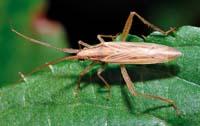Plague in the fields of China by the use of transgenic cotton

According to researchers at the Chinese Academy of Agricultural Sciences, the planting of transgenic cotton has resulted in the proliferation of previously controlled insects and plague. The results of the research, published in the scientific journal Science, show that it is not enough to plant GMOs to prevent pests.
In 1997 the planting of Bt transgenic cotton was authorized in China. It contains a toxic worm gene (Helicoverpa armigera) that severely affects cotton and other plants, the bacterium Bacillus thuringiensis. In the case of using Bt cotton, farmers did not have to use pesticides against the worm, so cotton producers would be cheaper than before. With this hope, more than 4 million hectares of transgenic cotton have been planted in China.
Researchers have analyzed for ten years 3 million hectares of cotton and 26 million hectares of other plants in northern China. And they discover that the insects of the family Miridae are 12 times more numerous than in 1997. That is, they have become plague.
In addition, they have shown that planting transgenic cotton is directly related to the proliferation of bugs. This seems to be because farmers have stopped using pesticides: by planting transgenic cotton, they do not have to use anti-worm pesticides, but they have allowed them to spread to other bugs.
According to the researchers, the bugs in the Miridae family are as harmful to the harvest as worms and have spread to other plantations such as soy, cereals, vegetables and some fruits.
Buletina
Bidali zure helbide elektronikoa eta jaso asteroko buletina zure sarrera-ontzian











